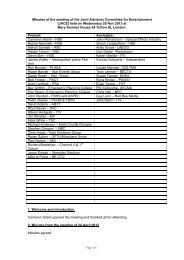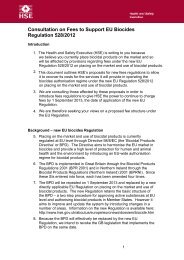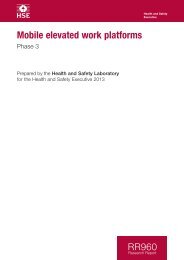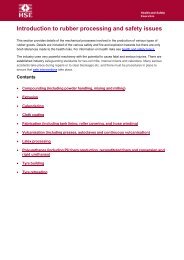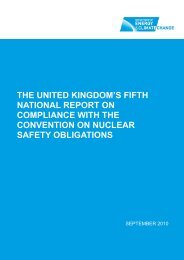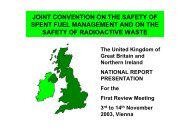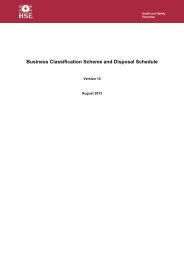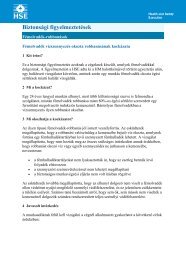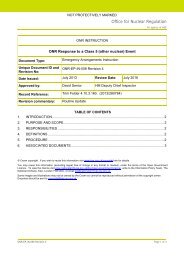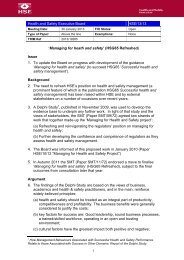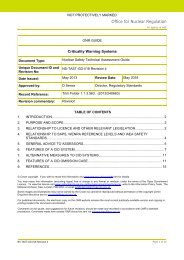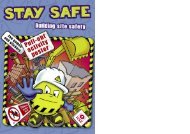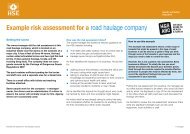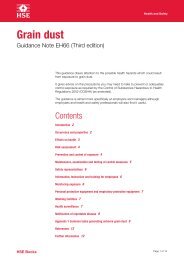indg329 - Benzene and you - HSE
indg329 - Benzene and you - HSE
indg329 - Benzene and you - HSE
Create successful ePaper yourself
Turn your PDF publications into a flip-book with our unique Google optimized e-Paper software.
Health <strong>and</strong> Safety<br />
Executive<br />
How can it get into <strong>you</strong>r body?<br />
<strong>Benzene</strong> can be absorbed into <strong>you</strong>r body if <strong>you</strong>:<br />
■■<br />
■■<br />
■■<br />
breathe in air containing benzene vapour;<br />
absorb it through <strong>you</strong>r skin;<br />
swallow material containing it.<br />
What are the health hazards?<br />
The effects on <strong>you</strong>r health depend on how much benzene <strong>you</strong> are exposed to <strong>and</strong><br />
for how long.<br />
As with other organic solvents, immediate effects of a single exposure to a high<br />
concentration (hundreds of ppm <strong>and</strong> more) can include:<br />
■■<br />
■■<br />
■■<br />
■■<br />
headache;<br />
tiredness;<br />
nausea;<br />
dizziness.<br />
<strong>Benzene</strong> can also cause unconsciousness if exposure is very high (thous<strong>and</strong>s of<br />
ppm).<br />
Long-term exposure to lower concentrations of benzene can result in:<br />
■■<br />
■■<br />
bone marrow suppression leading to serious blood disorders such as anaemia;<br />
cancer – forms of leukaemia <strong>and</strong> other white-blood-cell cancers.<br />
What does <strong>you</strong>r employer have to do?<br />
The Control of Substances Hazardous to Health Regulations 2002 (COSHH) require<br />
<strong>you</strong>r employer to:<br />
■■<br />
■■<br />
■■<br />
■■<br />
■■<br />
■■<br />
■■<br />
assess the risks to <strong>you</strong>r health <strong>and</strong> identify the precautions needed for <strong>you</strong>r<br />
protection;<br />
prevent <strong>you</strong> being exposed to benzene, or where this cannot reasonably be<br />
done, adequately control <strong>you</strong>r exposure;<br />
reduce <strong>you</strong>r exposure to benzene so far as is reasonably practicable, <strong>and</strong> in<br />
any case, below the workplace exposure limit (WEL) assigned for benzene of 1<br />
part per million (ppm) of air averaged over an 8-hour period;<br />
maintain all fume <strong>and</strong> dust controls in efficient working order;<br />
find out how much benzene <strong>you</strong> are exposed to, normally through a monitoring<br />
programme, <strong>and</strong> tell <strong>you</strong> the results;<br />
arrange any health checks that are needed;<br />
inform, instruct <strong>and</strong> train all employees who may be exposed to benzene.<br />
What does ‘reasonably practicable’ mean?<br />
An explanation of what ‘reasonably practicable’ means is provided at www.hse.gov.<br />
uk/risk/faqs/htm.<br />
<strong>Benzene</strong> <strong>and</strong> <strong>you</strong> Page 2 of 4
Health <strong>and</strong> Safety<br />
Executive<br />
What should <strong>you</strong> do?<br />
■■<br />
■■<br />
■■<br />
■■<br />
■■<br />
■■<br />
Use the extraction equipment or other control measures correctly.<br />
Use the protective clothing <strong>and</strong> equipment provided.<br />
Always use the washing facilities provided, which should be adequate <strong>and</strong><br />
suitable for <strong>you</strong>r needs.<br />
If <strong>you</strong> have to wear a respirator, make sure:<br />
■■<br />
it fits properly;<br />
■■<br />
if it is a tight-fitting mask, that <strong>you</strong> have been fit tested <strong>and</strong> are clean shaven;<br />
■■<br />
it is clean <strong>and</strong> in good working order;<br />
■■<br />
the filter is changed regularly;<br />
■■<br />
it is stored in a clean/dry place, preferably a locker.<br />
Report defects in enclosures, extraction equipment or other control measures<br />
to <strong>you</strong>r employers.<br />
Don’t eat or drink in work areas where benzene may be present.<br />
What about health checks?<br />
The health of people exposed to benzene <strong>and</strong> its compounds should be monitored<br />
by an occupational health professional:<br />
■■<br />
■■<br />
they will normally carry out an examination after an offer of employment <strong>and</strong> will<br />
see <strong>you</strong> at regular intervals during <strong>you</strong>r employment. You will be asked to<br />
provide a urine sample so its benzene content can be measured;<br />
if more examination or tests are needed, the occupational health professional<br />
will explain.<br />
What information can <strong>you</strong> get?<br />
Your employer should tell <strong>you</strong> about:<br />
■■<br />
■■<br />
■■<br />
■■<br />
■■<br />
■■<br />
the risks to health from the use of benzene;<br />
the safe way of working, the reasons for it, <strong>and</strong> how to use equipment properly,<br />
eg extraction systems;<br />
the reasons for personal protective equipment <strong>and</strong> clothing, the jobs where<br />
they are needed, <strong>and</strong> how they should be used, stored <strong>and</strong> maintained;<br />
the results of any tests for benzene levels in the air of <strong>you</strong>r workplace;<br />
the role of any health surveillance <strong>and</strong> arrangements for <strong>you</strong> to know the<br />
results;<br />
any further requirements of COSHH.<br />
Poisoning by benzene is a prescribed disease in the UK <strong>and</strong> may entitle <strong>you</strong> to<br />
Industrial Injuries Disablement Benefit.<br />
If <strong>you</strong> have any worries or problems about working with benzene, ask <strong>you</strong>r<br />
supervisor or safety representative to discuss them with <strong>you</strong>r employer, or discuss<br />
them with <strong>you</strong>r occupational health professional.<br />
Need to know more?<br />
Hazardous substances at work: A brief guide to COSHH Leaflet INDG136(rev5)<br />
<strong>HSE</strong> Books 2012 www.hse.gov.uk/pubns/indg136.htm<br />
<strong>Benzene</strong> <strong>and</strong> <strong>you</strong> Page 3 of 4
Health <strong>and</strong> Safety<br />
Executive<br />
Further information<br />
For information about health <strong>and</strong> safety, or to report inconsistencies or inaccuracies<br />
in this guidance, visit www.hse.gov.uk/. You can view <strong>HSE</strong> guidance online <strong>and</strong><br />
order priced publications from the website. <strong>HSE</strong> priced publications are also<br />
available from bookshops.<br />
This guidance is issued by the Health <strong>and</strong> Safety Executive. Following the guidance<br />
is not compulsory, unless specifically stated, <strong>and</strong> <strong>you</strong> are free to take other action.<br />
But if <strong>you</strong> do follow the guidance <strong>you</strong> will normally be doing enough to comply with<br />
the law. Health <strong>and</strong> safety inspectors seek to secure compliance with the law <strong>and</strong><br />
may refer to this guidance.<br />
This leaflet is available at: www.hse.gov.uk/pubns/<strong>indg329</strong>.htm.<br />
© Crown copyright If <strong>you</strong> wish to reuse this information visit<br />
www.hse.gov.uk/copyright.htm for details. First published 10/13.<br />
Published by the Health <strong>and</strong> Safety Executive INDG329(rev1) 10/13<br />
Page 4 of 4



